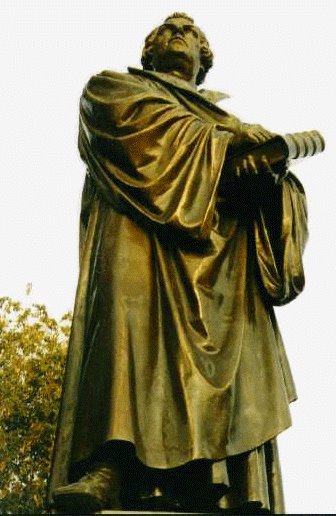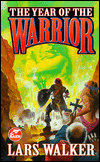Luther Library

24 April 2006
Quasimodo-22
Lutheran Carnival XXII at Ask the Pastor
Art by Picasso, Rubens, and Cranach ... Latin words ... Victor Hugo and Joseph Heller references ... pictures of Pastor Snyder's "unknown Lutheran" ... plenty of links to good Lutheran writing, including a newly-discovered confessional blogger. Yep, Like Newborn Carnivals, we arise to await the bestowal of God's gifts.
The bells, the bells....
Art by Picasso, Rubens, and Cranach ... Latin words ... Victor Hugo and Joseph Heller references ... pictures of Pastor Snyder's "unknown Lutheran" ... plenty of links to good Lutheran writing, including a newly-discovered confessional blogger. Yep, Like Newborn Carnivals, we arise to await the bestowal of God's gifts.
The bells, the bells....
21 April 2006
Deadline Looming for Carnival Entries
Get 'em in, people. While I may be able to squeeze in a few more after the official 7 p.m. cutoff, I need time to assemble and edit Sunday's Lutheran Carnival. Since I'm also preaching, teaching, coaching track, finishing some devotions for publication, and trying to remain sane, happily married, and heading my household in Godly manner, I hope that you'll help by choosing your own posts or nominating those of others according to the house rules and the general submission guidelines and submitting them as quickly as possible.
Thank you, and here's the edress: lutherancarnival AT gmail DOT com
From Ask the Pastor.
Get 'em in, people. While I may be able to squeeze in a few more after the official 7 p.m. cutoff, I need time to assemble and edit Sunday's Lutheran Carnival. Since I'm also preaching, teaching, coaching track, finishing some devotions for publication, and trying to remain sane, happily married, and heading my household in Godly manner, I hope that you'll help by choosing your own posts or nominating those of others according to the house rules and the general submission guidelines and submitting them as quickly as possible.
Thank you, and here's the edress: lutherancarnival AT gmail DOT com
From Ask the Pastor.
17 April 2006
Attention Confessional Bloggers
Ask the Pastor needs more submissions for the next Lutheran Carnival. Please check the house rules for this edition and the general submission guidelines.
Ask the Pastor needs more submissions for the next Lutheran Carnival. Please check the house rules for this edition and the general submission guidelines.
14 April 2006
Lars Walker: Lutheran Novelist
A Review of The Year of the Warrior
Lars Walker's novels can be found in the Science Fiction and Fantasy aisles. They are paperbacks, with those great comic book-style cover illustrations, something to read for their action, excitement, and the sheer fun that reading can be. But these particular books rise far above the typical pulp fiction. They are stylistically alive. And they are deeply, profoundly Christian. In fact, they are deeply, profoundly Lutheran. Not in the usually sappy and preachy way of the "Christian fiction" subgenre but in a bold, battling way. And far from diminishing the books' appeal in the mainstream literary marketplace, their Christianity and their Lutheranism are intrinsic to their imaginative power.
 I just finished The Year of the Warrior. Though published by the SciFi press Baen, it's really closer to historical fiction, focusing on the conversion of the Vikings to Christianity and depicting the real-life exploits of the noble Norse lord Erling Skjalgsson and the less-admirable King Olaf (later promoted to "St."). The tale centers around an Irishman kidnapped in a Viking raid who poses as a priest and then finds himself becoming one. The fantasy dimension comes as the Christians are challenged by the demonic forces of the old paganism.
I just finished The Year of the Warrior. Though published by the SciFi press Baen, it's really closer to historical fiction, focusing on the conversion of the Vikings to Christianity and depicting the real-life exploits of the noble Norse lord Erling Skjalgsson and the less-admirable King Olaf (later promoted to "St."). The tale centers around an Irishman kidnapped in a Viking raid who poses as a priest and then finds himself becoming one. The fantasy dimension comes as the Christians are challenged by the demonic forces of the old paganism.
There is lots of swordplay. And lots of even more dramatic spiritual warfare, both externalized in eerie confrontations with dark forces and internalized in the struggles of the main characters with their own sin and doubts. The context is the turning of the first millennium in 1000 A.D. ("the year of the warrior"), which many people thought would be the End of Time and Christ's return. So the theological climate is early-medieval Catholicism. But the Lutheranism comes in the criticism of many elements of that theology (such as the practice of forced conversion) as well as in the evangelical appropriation of many of its features (the power of confession and absolution; the power of Baptism; the power of the Cross). And throughout is the figure of Christ and the truth of the Gospel, in contrast to counterfeit Christianities and the demonic gods of the pagans.
Lars also gets in some good shots at today's false spiritualities — matter-denying Gnosticism, New Age paganism, and worldly churches. Says a bishop who wants to convert the masses by using the church growth methodology of killing them if they refuse: "Times change. We must change with the times. What use to obey Him in
this or that point if we fail to win the world for Him."
I don't want to create the impression that the book is heavy-going. It's not. It's frequently funny. (It is not, however, for those squeamish about violence and sin.) And the voice of the slave-priest Father Aillil who narrates the tale is addictive.
Lars Walker (a frequent commenter on the Cranach blog) is a member of a Free Lutheran congregation. I'm reading his other books and will report on them as well. Meanwhile, here is someone to read.
Review written by Dr. G. E. Veith and cross-posted at Cranach.


Year of the Warrior
Lars Walker's novels can be found in the Science Fiction and Fantasy aisles. They are paperbacks, with those great comic book-style cover illustrations, something to read for their action, excitement, and the sheer fun that reading can be. But these particular books rise far above the typical pulp fiction. They are stylistically alive. And they are deeply, profoundly Christian. In fact, they are deeply, profoundly Lutheran. Not in the usually sappy and preachy way of the "Christian fiction" subgenre but in a bold, battling way. And far from diminishing the books' appeal in the mainstream literary marketplace, their Christianity and their Lutheranism are intrinsic to their imaginative power.
 I just finished The Year of the Warrior. Though published by the SciFi press Baen, it's really closer to historical fiction, focusing on the conversion of the Vikings to Christianity and depicting the real-life exploits of the noble Norse lord Erling Skjalgsson and the less-admirable King Olaf (later promoted to "St."). The tale centers around an Irishman kidnapped in a Viking raid who poses as a priest and then finds himself becoming one. The fantasy dimension comes as the Christians are challenged by the demonic forces of the old paganism.
I just finished The Year of the Warrior. Though published by the SciFi press Baen, it's really closer to historical fiction, focusing on the conversion of the Vikings to Christianity and depicting the real-life exploits of the noble Norse lord Erling Skjalgsson and the less-admirable King Olaf (later promoted to "St."). The tale centers around an Irishman kidnapped in a Viking raid who poses as a priest and then finds himself becoming one. The fantasy dimension comes as the Christians are challenged by the demonic forces of the old paganism.There is lots of swordplay. And lots of even more dramatic spiritual warfare, both externalized in eerie confrontations with dark forces and internalized in the struggles of the main characters with their own sin and doubts. The context is the turning of the first millennium in 1000 A.D. ("the year of the warrior"), which many people thought would be the End of Time and Christ's return. So the theological climate is early-medieval Catholicism. But the Lutheranism comes in the criticism of many elements of that theology (such as the practice of forced conversion) as well as in the evangelical appropriation of many of its features (the power of confession and absolution; the power of Baptism; the power of the Cross). And throughout is the figure of Christ and the truth of the Gospel, in contrast to counterfeit Christianities and the demonic gods of the pagans.
Lars also gets in some good shots at today's false spiritualities — matter-denying Gnosticism, New Age paganism, and worldly churches. Says a bishop who wants to convert the masses by using the church growth methodology of killing them if they refuse: "Times change. We must change with the times. What use to obey Him in
this or that point if we fail to win the world for Him."
I don't want to create the impression that the book is heavy-going. It's not. It's frequently funny. (It is not, however, for those squeamish about violence and sin.) And the voice of the slave-priest Father Aillil who narrates the tale is addictive.
Lars Walker (a frequent commenter on the Cranach blog) is a member of a Free Lutheran congregation. I'm reading his other books and will report on them as well. Meanwhile, here is someone to read.
Review written by Dr. G. E. Veith and cross-posted at Cranach.

Year of the Warrior
13 April 2006
A Different Kind of "Call for Papers"
Luther Library member Pastor Walter Snyder just released a request for posts for the next Lutheran Carnival. A Carnival "Call for Papers" includes suggestions and house rules for the next rendition. Also, he reminds us that another "librarian," Dan at Necessary Roughness, hosts the current carnival.
Luther Library member Pastor Walter Snyder just released a request for posts for the next Lutheran Carnival. A Carnival "Call for Papers" includes suggestions and house rules for the next rendition. Also, he reminds us that another "librarian," Dan at Necessary Roughness, hosts the current carnival.
09 April 2006
Lutheran Carnival
Dan at Necessary Roughness has unveiled Lutheran Carnival XXI: Palm Sunday. See what's been happening in the past four weeks of Lutheran blogging.
Dan at Necessary Roughness has unveiled Lutheran Carnival XXI: Palm Sunday. See what's been happening in the past four weeks of Lutheran blogging.
07 April 2006
Skeleton in God's Closet
 I read this a few months back. A coworker of mine read it and told me about it, I had heard about Paul Maier before, I'd even seen some of his videos about Acts and I've met him once or twice, but I'd never read this book. The interesting thing about the friend who recommended it to me was he is one of those "unreligious" folks. But he was really excited about the book and I decided that it might be a good idea to read it, too. If for no other reason than to be able to talk about it over beer mugs, but why do I bring it up now? There has been some talk about a new book coming out called the Jesus Papers, which, if understand it correctly, does its darnedest to disprove the basic tenents of Christianity... Jesus' resurrection.
I read this a few months back. A coworker of mine read it and told me about it, I had heard about Paul Maier before, I'd even seen some of his videos about Acts and I've met him once or twice, but I'd never read this book. The interesting thing about the friend who recommended it to me was he is one of those "unreligious" folks. But he was really excited about the book and I decided that it might be a good idea to read it, too. If for no other reason than to be able to talk about it over beer mugs, but why do I bring it up now? There has been some talk about a new book coming out called the Jesus Papers, which, if understand it correctly, does its darnedest to disprove the basic tenents of Christianity... Jesus' resurrection.
A Skeleton in God's Closet is an interesting book. It has a truly intriguing premise: the bones of Jesus are found in a grave outside of Jerusalem by an archaeologist. It is part adventure, part archaeological sleuth story, part romance, and part discussion of faith. I'm reluctant to say much about it because I don't want to give away the whole story.
Maier's well known New Testement scholarship comes through, as does his knowledge of archaeology. He stitches together a good story that certainly kept my interest (this book is a nice counter point to the Da Vinci Code by Dan Brown. It certainly is more meaty, too. At times, though Maier does get a bit too deep into the minutiae of archaeology, but that can be forgiven.
This book did bring up some thoughts that I hadn't had before for example: what would happen if someone did truly find the bones of Christ (and could prove it without a doubt)? How would the world react?
Who is this book for? I'd say its for just about anyone who likes a good thinking novel. It will make the reader think and, hopefully will make the reader ask questions. It might be a fun book to read as a book club selection particularly in the church setting... a ladies aide book club? I'd also this book would be a good counterpoint to the Da Vinci Code, it asks questions, but doesn't try to debunk anything that can't be debunked. Actually, it could be a great be a faith stregnthener (poor word choice, but I think you get my meaning).
I can't recommend this book enough.
Feedback
 I read this a few months back. A coworker of mine read it and told me about it, I had heard about Paul Maier before, I'd even seen some of his videos about Acts and I've met him once or twice, but I'd never read this book. The interesting thing about the friend who recommended it to me was he is one of those "unreligious" folks. But he was really excited about the book and I decided that it might be a good idea to read it, too. If for no other reason than to be able to talk about it over beer mugs, but why do I bring it up now? There has been some talk about a new book coming out called the Jesus Papers, which, if understand it correctly, does its darnedest to disprove the basic tenents of Christianity... Jesus' resurrection.
I read this a few months back. A coworker of mine read it and told me about it, I had heard about Paul Maier before, I'd even seen some of his videos about Acts and I've met him once or twice, but I'd never read this book. The interesting thing about the friend who recommended it to me was he is one of those "unreligious" folks. But he was really excited about the book and I decided that it might be a good idea to read it, too. If for no other reason than to be able to talk about it over beer mugs, but why do I bring it up now? There has been some talk about a new book coming out called the Jesus Papers, which, if understand it correctly, does its darnedest to disprove the basic tenents of Christianity... Jesus' resurrection. A Skeleton in God's Closet is an interesting book. It has a truly intriguing premise: the bones of Jesus are found in a grave outside of Jerusalem by an archaeologist. It is part adventure, part archaeological sleuth story, part romance, and part discussion of faith. I'm reluctant to say much about it because I don't want to give away the whole story.
Maier's well known New Testement scholarship comes through, as does his knowledge of archaeology. He stitches together a good story that certainly kept my interest (this book is a nice counter point to the Da Vinci Code by Dan Brown. It certainly is more meaty, too. At times, though Maier does get a bit too deep into the minutiae of archaeology, but that can be forgiven.
This book did bring up some thoughts that I hadn't had before for example: what would happen if someone did truly find the bones of Christ (and could prove it without a doubt)? How would the world react?
Who is this book for? I'd say its for just about anyone who likes a good thinking novel. It will make the reader think and, hopefully will make the reader ask questions. It might be a fun book to read as a book club selection particularly in the church setting... a ladies aide book club? I'd also this book would be a good counterpoint to the Da Vinci Code, it asks questions, but doesn't try to debunk anything that can't be debunked. Actually, it could be a great be a faith stregnthener (poor word choice, but I think you get my meaning).
I can't recommend this book enough.
Feedback
